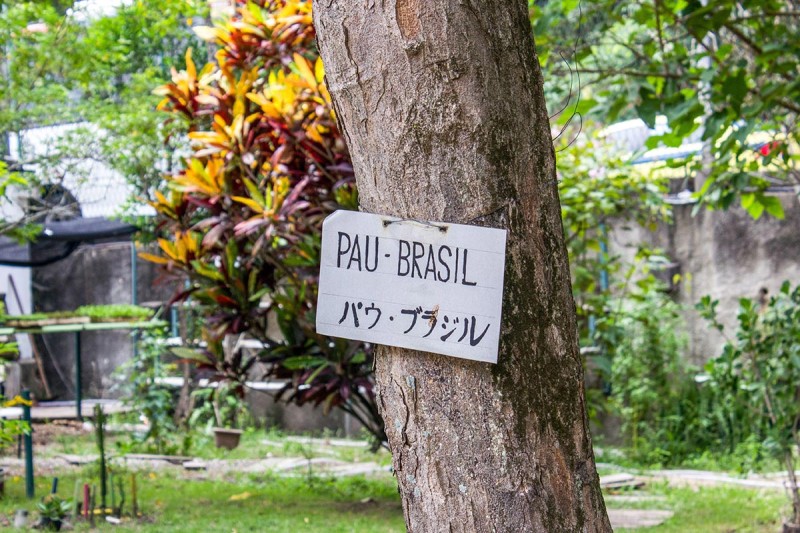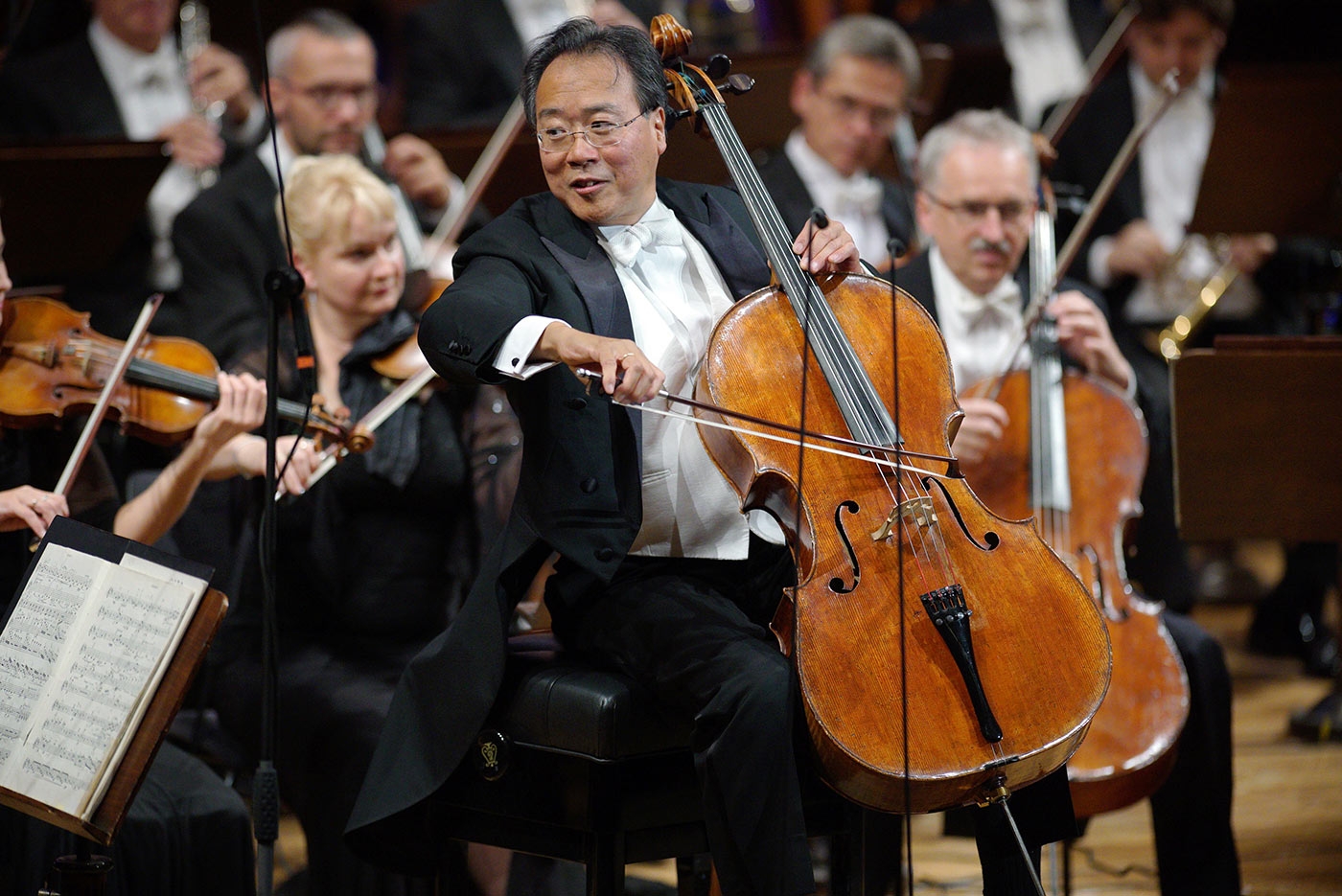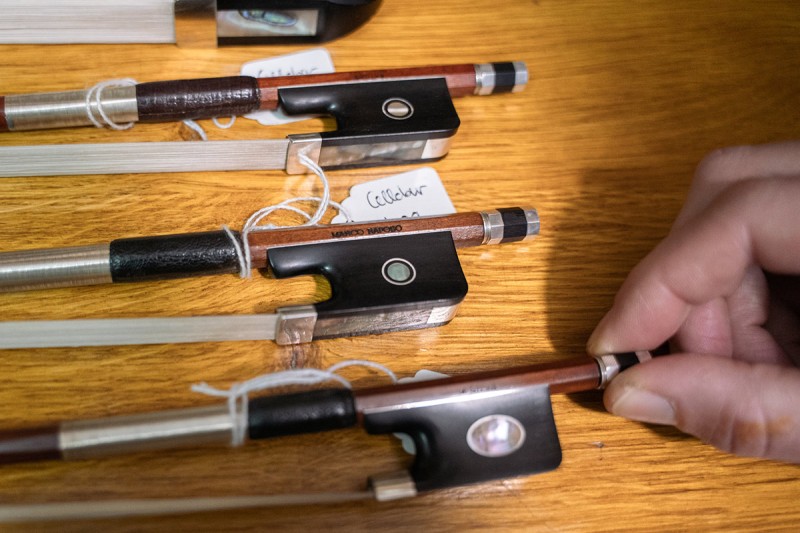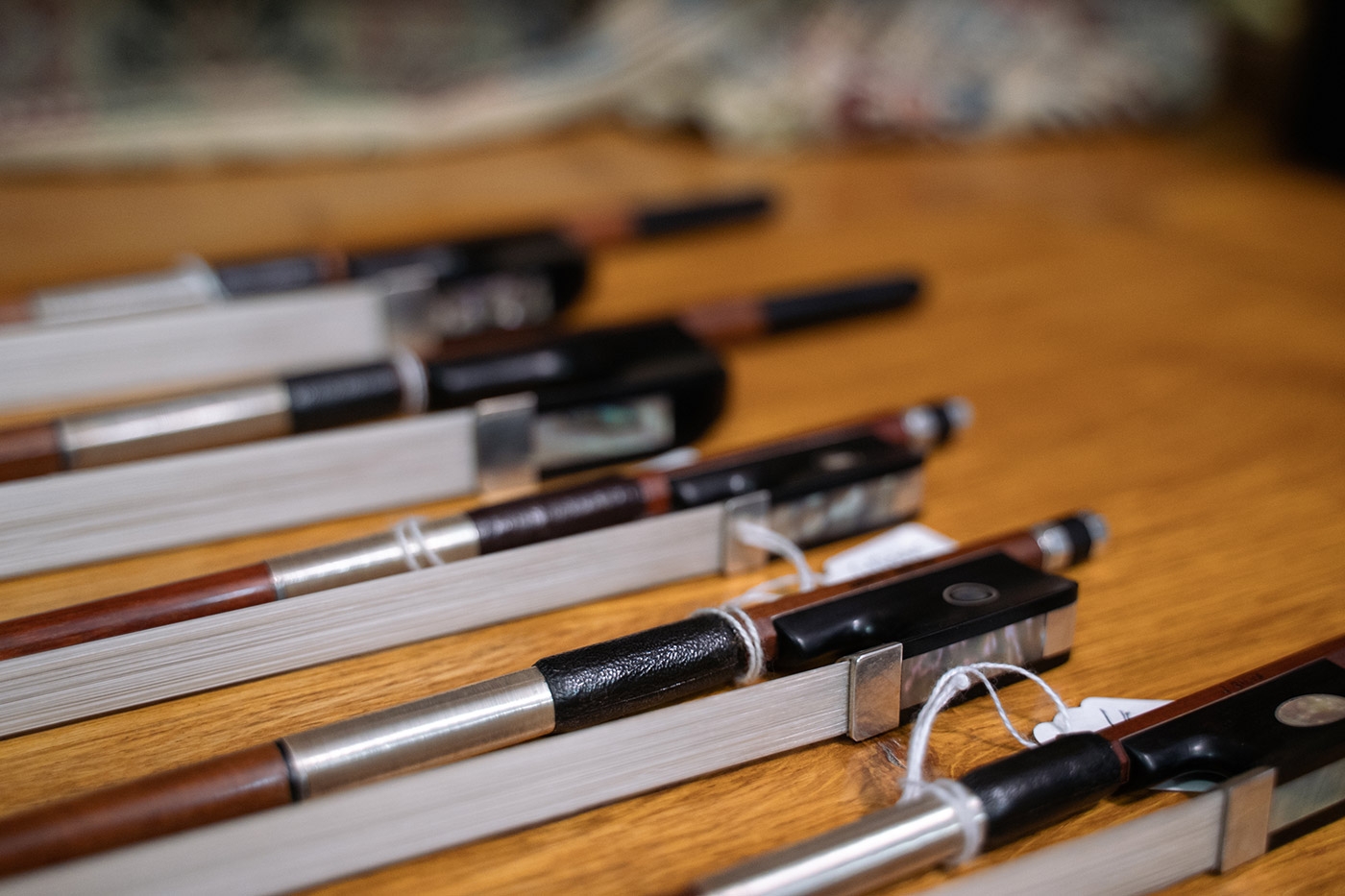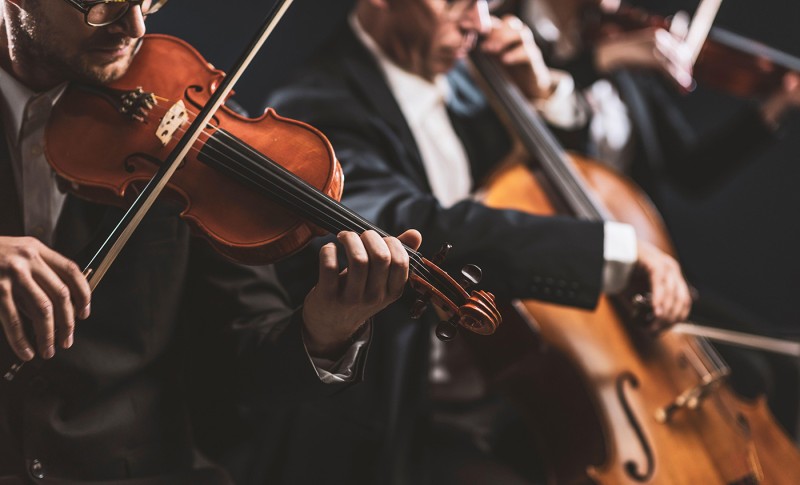As soon as the officers from Brazil’s environmental investigation agency spotted well-known bow maker Marco Antonio Raposo Nascimento preparing to board a flight to Europe out of São Paulo’s international airport in April, they suspected something was wrong.
Indeed, X-rays showed Raposo’s luggage was stuffed with 114 horsehair bows and another 120 wooden rods that could be used to make more. Tests showed all of them were made of brazilwood, an endangered hardwood that is considered a symbol of Brazil.
Raposo was arrested at the airport, charged with smuggling, and fined 105,300 Brazilian reais ($20,172), according to an arrest report obtained by reporters. Two men who were with him fled before they could be apprehended, one of them abandoning another suitcase full of wood in his hurry to get away.
Raposo is among a select group of Brazilian artisans who make bows for stringed musical instruments like violins and cellos out of brazilwood. Prized for its resilience, density, and distinctive reddish hue, bows crafted from the slow-growing hardwood have made strings sing for centuries in concert halls and opera theaters around the world.
Though relatively small, the bow industry is highly lucrative. Sticks of brazilwood cost less than $8 in Brazil, but once crafted into bows they can sell for more than 300 times as much in the U.S., Europe, and Asia. Raposo’s bows are sold by music stores in the U.S. and U.K. for up to $2,500 apiece, while others can go for even more.
But as supplies of brazilwood have dwindled, many of Brazil’s bow makers — known as archetiers — have turned to illegally harvested wood. The region where it grows, the Atlantic Forest, is now one of the most threatened biomes in the world. At present only the trade in raw brazilwood is regulated under the Convention on International Trade in Endangered Species (CITES), though rules governing the export of newly made bows are being drawn up.
In a bid to crack down on brazilwood smuggling, Brazilian authorities launched Operation Dó-Ré-Mi in 2018. Since then, officers have confiscated almost 150,000 bows and wooden sticks from 33 bowmakers, who together have been fined over $10 million for trading in undocumented wood, according to records from the environmental investigation agency, IBAMA, obtained by Data Fixers/Fiquem Sabendo and the Brazilian magazine piauí. One of the top offenders was Raposo, who has been fined at least eight times during his career and stopped at the São Paulo airport carrying suspect wood at least twice.
In response to questions from journalists, Raposo conceded he did not have the proper documentation for the wood he was carrying when he was stopped at the airport in May, but he claimed the “error was not intentional” and that the wood was of legal origin. He said all sanctions against his company had been withdrawn or are still pending, and that he had never been found to be dealing in wood from protected areas. (According to IBAMA, he has paid two of the fines and is appealing the rest, a process that can take years in Brazil.)
“I have never been part of any type of criminal scheme,” Raposo wrote in an email. “Being fined does not mean guilt.”
Reporters tracked down the identities of Raposo and the 32 other bowmakers targeted in Operation Dó-Ré-Mi — who have never been publicly named before — by cross-referencing court cases, public records, and official data obtained through freedom of information requests. They include several other prominent Brazilian archetiers who IBAMA believes have been trafficking brazilwood overseas.
“It is evident they have formed a large gang specialized in extracting brazilwood from protected areas, transforming it into bows, and trading it abroad,” IBAMA officials wrote in multiple reports related to Operation Dó-Ré-Mi, calling for the urgent involvement of the Public Prosecutor's Office and the federal police to “deepen investigations into the destructive actions of these criminals.”
On November 8, officers from the Federal Police and IBAMA raided 37 properties connected to what they described as a “criminal group” of bowmakers as part of the operation. The police declined to confirm if these included any of the people and companies identified by reporters because their investigation is ongoing.
As law enforcement has tried to crack down on trafficking of brazilwood, authorities have also sought to tighten regulations on how it’s legally traded. In November, signatories to the CITES treaty voted to extend restrictions to include brazilwood bows and instruments, meaning Brazil’s archetiers will need to obtain permits to export newly made bows for sale overseas.
Plans to regulate the bow trade have faced fierce opposition from the classical music industry, with famous figures like Simon Rattle, the music director of the London Symphony Orchestra, cellist Yo-Yo Ma, and pianist Martha Argerich arguing the restrictions would spell the end of the bow making profession and destroy 300 years of culture.
But ecologists say the sale of brazilwood bows must be banned if the species is to be saved.
“If there is a buyer, especially in euros or dollars, there will be someone who facilitates this sale,” said André Freitas, a professor at Unicamp's Institute of Biology. “The price you pay is the extinction of a species. There needs to be an ethical limit.”
The Music Tree
Over the course of a two-decade career, Raposo has become a public face of the Brazilian bow industry. According to a report quoting him in Brazilian media, he started selling bows made by a friend in Europe in 2004 while working as a flight attendant, before taking up the craft himself.
In 2006, Raposo set up a civil society organization dedicated to preserving brazilwood, the Instituto Verde Brasil, in the state of Espírito Santo, the home of Brazil’s bow making industry. In a filing related to his arrest, Raposo’s lawyers said his organization works with local government and research institutes to encourage reforestation.
Raposo said he no longer sits on the organization’s board, but noted that it has planted more than 400,000 brazilwood seedlings in the state of Espirito Santo and about 130,000 more in Bahia since it was founded.
Buttressed by his conservation work, Raposo has also become a vocal advocate for commercial brazilwood cultivation. In 2009 he appeared as an interviewee in “A Árvore da Música,” or “The Music Tree,” a documentary film about saving brazilwood.
“For us to continue this beautiful work [manufacturing bows] we have to have a new conscience,” he said. “To continue this art, we will have to have raw material, and to have raw material, we will have to plant commercially.”
Musicians and other Brazilian bow makers were shocked to hear about the investigations into Raposo when contacted by reporters. "He is quite famous," said one archetier from São Paulo, who asked not to be named as he did not want to be associated with any controversial dealings, saying they met over a discussion about brazilwood conservation.
After his arrest in April, Raposo admitted to police that he had attempted to smuggle the brazilwood out of the country, but said he had resorted to transporting it illegally only after the permits he applied for were delayed. Raposo said he had opted to break the law, rather than wait, because he was in financial straits, according to the police report.
Raposo was released after a custody hearing, but investigations into him continue. In November, a regional tribunal agreed to allow the Federal Public Prosecutor's Office to tap his phones as part of their investigation.
This wasn’t Raposo’s first brush with the law, either. IBAMA officers had stopped him the previous year on the way to Switzerland with a suitcase filled with over 200 bows, though they could not immediately confirm they were made of brazilwood. In the arrest report, public attorney Guilherme Rocha Gopfert noted that Raposo made a "large number of international trips,” which "seem to be aimed precisely at the sale of illegally exported products.”
Raposo denied he was part of any criminal scheme. All sanctions against his company “have either been withdrawn or are still pending,” he said in an email, attaching several IBAMA certificates clearing his company to trade.
Raposo’s bows are sold in the U.S. and Europe, where they can retail for up to $2,500 each, though there is no indication that any of the sellers are aware these could be made from illicit wood. At one shop in London, OCCRP was shown five bows made by his company, some of which sell for more than 1,400 British pounds.
The shop’s owner said he had known Raposo for more than 25 years, describing his bows as “excellent.” He said he was always “keenly aware of deforestation” being an issue, so had discussed it with Raposo and was glad to hear of his planting initiatives.
“This was a relief to hear, which is why it's quite distressing to hear your information about Marco now,” said the owner, who OCCRP is not naming as there is no indication he knew of the allegations against Raposo.
In 2019, Raposo’s company was also fined after IBAMA investigators discovered irregularities in its paperwork during an inspection of its office. Officers who visited the site, in Domingos Martins in Espírito Santo, said the company had failed to log all of the wood it held, and had entered “partially misleading” information in its records.
While the officers searched, Raposo drank alcohol, refused to hand over documents, and shouted at the inspectors that they were “mangy dogs,” one of them wrote in a report on the visit.
"I have never received such rude treatment, with such offensive words … during the hundreds of inspections that I have participated in,” it said, adding that Raposo "sees himself as more qualified than anyone in or outside the government, and in other countries.”
Raposo said he respects “each and every employee of IBAMA and/or any other government body. I trust IBAMA, and hope to be able to prove my innocence, as I have been doing for 25 years.”
Most recently, Raposo’s company was fined another 1.8 million Brazilian reais ($356,000) for storing wood without a valid license in June 2022, two months after he was arrested trying to sneak the brazilwood through the airport. (He still has an opportunity to appeal this fine.)
‘More Profitable than Cocaine’
Despite IBAMA’s efforts, smuggling protected wood is a low-risk, high-reward trade.
"It is more profitable to sell our wood than to sell cocaine. It is an absurd profit and a much lower risk,” said Eugenio Ricas, the superintendent of the Federal Police of Espírito Santo, the epicenter of Brazil’s bow manufacturing industry.
“Each bow costs between 20 and 40 reais ($8) [to make], and then it [is sold] in Europe or the U.S. for $2,600,” Ricas said. “If you sell cocaine, you are arrested and there is no social acceptance. You are seen as a drug dealer and will spend five years behind bars. On the other hand, those who extract wood are socially accepted. People don't see them as dangerous criminals.”
IBAMA believes that most of the brazilwood confiscated during Operation Dó-Ré-Mi originated in a protected area in the south of Bahia state. A local man and his daughter admitted to investigators that they had been acting as “mules” or middlemen to smuggle it out of the region. The wood was then sent to bowmakers in Espírito Santo.
"IBAMA's perception is that a large part of the market for brazilwood bows is based on wood extracted in a criminal way from conservation units or forests in private areas,” said a document from an inspection by the agency of one of the 33 companies identified by reporters.
Documents from IBAMA show the 33 companies and people, including Raposo, have faced charges ranging from buying wood without the proper paperwork to trying to conceal its origins, but the agency has never publicly named them before. Almost 150,000 bows and sticks of brazilwood have been confiscated and 77 fines worth nearly 54.7 million Brazilian reais ($10.5 million) have been handed out since Operation Dó-Ré-Mi began.
IBAMA frequently refers to the bowmakers as a “gang” in its reports, though it does not explain how they are connected. Six of them are members of the Association of Craftsmen and String Instrument Companies United for the Preservation of the Brazilian Atlantic Forest, including its president and five directors. Several others share family connections, or do business together. But reporters could find no proof that the 33 bowmakers have all been working together to smuggle wood.
The association said several of its members had “been the target of abusive and excessive tax actions” since 2018, describing IBAMA’s operation targeting the bow making industry as “disproportionate.”
“The sector continues to be treated as an environmental villain, as if we entered the forests and left with trucks loaded with dozens of brazilwood logs,” it said in a statement sent to reporters.
Among those targeted were master Brazilian archetiers Elias Guasti and José Bottoni — better known internationally as Guasti & Bottoni — who in 2012 were brought in to restore a bow once used by Brazil’s most famous composer, Heitor Villa-Lobos.
IBAMA officers believe Guasti and Bottoni have been smuggling brazilwood that was illegally harvested in protected areas for years. Since 2017, they have had more than 1,600 bows and other pieces of wood seized during four raids on their homes, according to data from the agency.
Guasti was caught by IBAMA officers trying to courier a package out of Brazil that contained wood restricted for sale abroad.
In May 2020, IBAMA officers raided his house, where they found the wood he had in storage was full of "cracks, holes, breaks, knots and signs of rot" and was kept in an area riddled with vermin. The poor state of the supplies led officers to suspect the bow makers were using other stocks of illegal wood to make their “excellent quality” bows.
A fine notice issued for Guasti called for investigators to “find out if these craftsmen receive or received material from suspicious origins with the intermediaries of this gang that trafficks Pau-brasil from the south of Bahia to Aracruz and region.”
Federal Police launched an investigation into the case. Asked about its current status, they said the probe was still open but declined to provide further details.
Guasti denied he had done anything wrong, saying he had received the wood he tried to smuggle via courier as a “donation” from IBAMA after it had been seized from another bowmaker, and didn’t realize this meant he was only allowed to use it for non-commercial purposes, not to make bows.
Regarding the IBAMA raid, Guasti said he had simply forgotten to update the paperwork for some of his wood when new rules came in, but said he generally had the correct permits and operated within the law. He criticized IBAMA, saying they had sent 10 armed officers to raid his house which had frightened his elderly mother and children.
“I think that in my case it was an exaggeration on the part of IBAMA,” he said. “I believe I have not committed an infraction.”
Most of the bows made in Brazil are sold overseas, mainly in Europe and the U.S. Reporters found the bows produced by the 33 bowmakers retail for as much as $4,000 in Europe and the U.S., a price range that two professional string players from the U.K. said meant they were targeted at professional musicians.
For example, an IBAMA report on bow maker JB Atelier — which has been targeted at least five times and fined more than 3 million Brazilian reais ($575,000) during Operation Dó-Ré-Mi — found all of its bows were exported to Miami from 2019-2021. From there they went to a local reseller owned by the same family as JB Atelier, Trade Sousa Bows, or were re-exported to the U.K. or Japan.
Julio Batista, the head of JB Atelier, said the company had bought the wood from another company with the proper documentation. He called IBAMA’s actions “disproportionate,” saying he operated within the law and the accusations had harmed his business.
“Being the target of a Federal Police operation is something that generates great discomfort, anguish, and tarnishes the name and image of the company, which, before any judgment, is already suffering serious consequences,” he wrote in an email.
No More Pau-Brazil
There is no concrete data on how much brazilwood is left in Brazil. The Atlantic Forest on Brazil’s eastern coast, the only place in the world where the wood grows, today has only 12.4 percent of its original cover, and is considered one of the most threatened biomes in the world.
"We are already reaching a situation where there is no more Pau-Brazil on the northeast coast,” said Freitas, from Unicamp's Institute of Biology, using another name for brazilwood.
Musicians argue their industry is not to blame for the deforestation, saying bow makers have worked to ensure the survival of brazilwood. Daniel Neves, the president of Brazil’s National Association of the Music Industry, said that violin bow sellers have planted more than 550,000 seedlings.
In a piece published in French newspaper Le Monde, more than 200 musicians railed against CITES’ plans to bring in trade restrictions on brazilwood instruments and bows, saying they use only “modest” amounts of wood compared to other industries.
“Let's not hinder the dissemination of culture in general and music in particular under false pretenses. Let's not make the musical world a scapegoat for deforestation,” said the commentary, backed by many of the industry’s top names.
Violinist Emilie Belaud, from the Paris Opera, described the changes as “a direct attack on our main working tool, the bow, an object of great international cultural significance for more than 300 years,” in an online petition that has garnered close to 20,000 signatures.
After a heated debate over expanding the CITES rules, the original plans to require musicians to get permits to transport their bows were scrapped. Under the new rules, which will come into force in Brazil in late February 2023, bow makers will only need to get CITES export permits for freshly crafted bows when they are exported for the first time.
Anafima, a music industry association that opposes restrictions on brazilwood, recently hosted an online discussion about the new law and the future of bow-making. In a video from the event posted online, one bowmaker acknowledged the industry’s complicity in the illegal wood trade, and urged his fellows to stop buying brazilwood from illicit sources.
“We who are in this field of making bows know that there are two businesses: one business is selling bows and the other is selling wood. Let’s be honest, selling natural pau-brasil, selling sticks,” he said.
“In the eyes of IBAMA, we are all dealers, gangsters, whether by act or design. In one way or another, we all buy illegal wood in a sense. … We know who cuts the wood, who sells it, and [we must] be tough with this group, because then … IBAMA will stop treating us as gangsters."
But for some, the new rules still don’t go far enough. Professor Henrique Dias, from the Department of Forest and Wood Sciences at the Federal University of Espírito Santo, said brazilwood should stop being used to make bows altogether. Otherwise, he said, the entire ecosystem it is part of could break down.
Protecting "brazilwood is not just [about] the brazilwood. There are microorganisms that sequester nitrogen, trees that store carbon, flowers that promote pollination, insects and birds that disperse seeds. The very existence of the species sustains other species,” he said.
"From the moment you extinguish the link, you are also extinguishing everything that relates to it. If we extinguish a species that gave the country its name, what do we want in terms of conservation?"
This story was supported by grants from the Brown Institute for Media Innovation and DocumentCloud/Muckrock.




